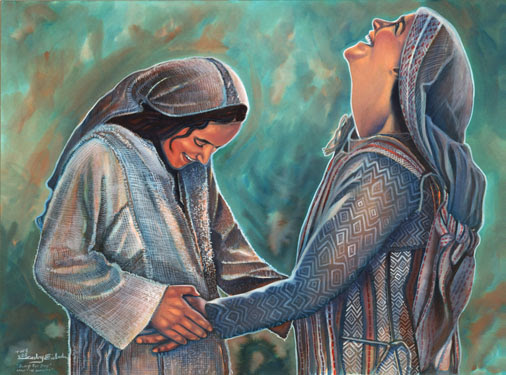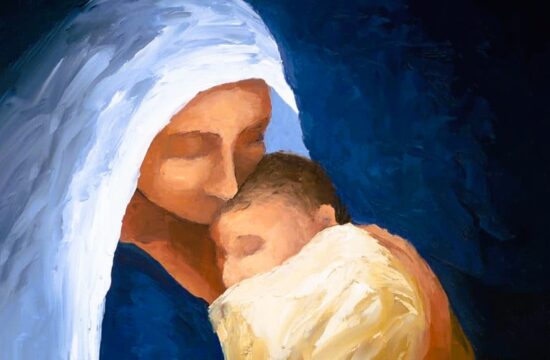One of the hardest assignments that I had to complete as a seminarian was when we were assigned in our Second Year of Theology for our Pastoral Assignment. Every semester they tried to vary it up a bit to have different experiences of working in a parish or some other setting to have some real-life experience of the priesthood. So my first year was great working when I was sent to a parish with people who were becoming Catholic and helping in their weekly meetings. I thought that was hard as I would try to prepare and research in advance on whatever the topic was for that week, unsure of what questions they might ask and not wanting to look ignorant. Which was so ridiculous. I ended up looking ignorant more times than not and the people couldn’t have been kinder or more supportive anyway. That paled in comparison to our second-year assignment where were sent to visit Hospice patients.
Thanks so much for stopping by to read this, my homily for the FOURTH SUNDAY OF ADVENT-December 18, 2021, for sharing it on your social media posts and your feedback and comments… I’m also grateful for all those who’ve asked for the audio version and share them as well at SOUNDCLOUD click HERE or from ITUNES as a podcast HERE. May the Lord be glorified in your reading and sharing Sincerely in Christ – Father Jim
-PS: We are in the midst of the Annual Red Hawk Catholic Christmas Appeal. As of this Sunday, we are almost 50% of our $25,000 goal- for more information if you’re interested in helping: https://www.facebook.com/donate/673334786984593/ or you can donate at www.RedHawkCatholic.com Thank You for your consideration!
The first few weeks it was just an orientation to explain what Hospice care was and meet some of the selfless staff, nurses, and volunteers who are committed to this work on a regular basis. If you’re like me, just hearing the word “hospice” was frightening. Perhaps it was just acknowledging that this type of care that takes care of those who are dying somehow makes the reality of death, really real – and something that makes people uncomfortable. After two or three weeks of just getting used to walking into the office building, we were told the following week we would be assigned patients to go visit every week.
That whole week before that first visit, I grew more and more anxious about it. What was I a 23-year-old second-year seminarian going to do for this woman and her family? How would I deal with her crying about her impending death? What would I say to family members who might want to take their anger about the situation on a person who is coming as a “representative” for God? With each passing day, my stomach was getting more and more in a knot. I was making myself sick to the point that the Monday night and throughout the day Tuesday before my 1:00 visit, I fasted. Not for spiritual purposes, but simply because I was so nervous, I wanted to get this over with and didn’t want to throw up. As I pulled up to the house in Elizabeth, New Jersey, after racing through the rosary maybe three times on a 10-minute car-ride, making the sign of the cross, I got out, knocked on the door. This middle-aged man answered the door. When I introduced myself, he gently smiled and said “thank you for coming, I’m Rosa’s son… she’ll be happy to meet you.” (Okay, first fear averted). As I entered the house there were a bunch of people sitting in the living room. As I was quickly being introduced to a relative, a neighbor, and just very matter of factly – Rosa, who wasn’t in a bathrobe, connected to an IV or even appeared sick. Before I even had a chance to walk through my rehearsed lines (after carefully reviewing a very helpful guide of “what not to say”) she clasped my hand with both of her hands, warmly welcomed me, made a joke in Spanish about my age telling her friends I was too young to be a priest… She let me pray with her and offer her communion, almost like when a grandmother lets their little grandkids play doctor… and when I was done, immediately returned to taking control of the conversation asking about me, where I was from, how long was I studying to be a priest, my family and so on. I walked out of there practically skipping. I was so relieved and so happy that my worst fears weren’t realized that I had almost forgotten she was dying. It’s probably because Rosa didn’t see it that way… As I grew to realize week after week. She didn’t want to talk about her diagnosis or what the doctors had told her (and not because she was in denial about the reality of her situation). All she did was tell me how Good her God was. All she did was brag on God. When she was in pain or had symptoms, she thanked God for the people who were around her, who were taking care of her, that she had this medicine. I had never met a woman like this, never had been in a situation like this. I was convinced the prayers were working. This woman’s faith made me convinced we were going to experience a miracle. That she would defy the odds and “survive” Hospice.
Rosa came to mind praying with today’s Gospel. This fourth Sunday of Advent, we heard the familiar beginnings of the Christmas Story where the Blessed Virgin Mary, having encountered the angel Gabriel at the Annunciation, where she is told this amazing news that she had been chosen by God the Father to bear his Son Jesus by the power of the Holy Spirit – also is told that her much older cousin Elizabeth also has some amazing news – she too was pregnant, 6 months in fact, with an important baby to come as well – John the Baptist.
We can get lost in the beloved details of the Christmas story to kind of see Elizabeth as just a minor character in the Nativity pageant in our minds. But there’s so much importance to Elizabeth’s story that deserves the reverence and respect to pause and reflect on. This much older woman is pregnant. To the world around them, this was somewhat preposterous news. Elizabeth was married to Zechariah, who was a High Priest. So in the Jewish faith and culture, they were respected and lived comfortable lives. Probably on many levels, they had everything they could have wanted, except one thing: a child of their own. That had to have been an emotional roller coaster for this holy couple over the decades they had been married.
How many nights did Elizabeth go to bed with tears that she couldn’t have a child? How many times did she see a baby in someone else’s arms – wanting to be joyful for them – but feeling sadness interiorly? Did she hear the gossip of neighbors about her “situation”? Did the devil through the vicious whispers of outsiders cause her to think of herself as “barren?” Through years and years of navigating all those thoughts and feelings, she somehow remained a woman in prayer, who trusted in her God and accepted His will, His providence. Somehow she made peace with these conflicting and painful realities and trust that God is Good, that God will accomplish His plan for her. This results in this unexpected, impossible made possible, shocking news that the “one called barren” becomes pregnant with one of the most important figures who would prepare the way for Jesus. It’s was so mind-blowing, unprecedented, that the one who should have been the most prepared of the two to accept this news, her husband the priest, is revealed to be one of weaker faith and greater doubts. When the angel Gabriel encounters Zechariah to tell him all this, (in the sanctuary as he is offering prayers and incense to God, of all places, mind you) he remains unbelieving. “How can this be?” he asks – pointing out that he and Elizabeth, they’re both old, it’s too late for them to bear a child. I wonder if the pains of his heart after so many years had left him lukewarm in his faith. Where he simply came, did his prayers and devotions, checking them off a list in his mind of his responsibilities… But not imagining, maybe not believing that God saw, listened, or cared about him. It’s interesting because the angel Gabriel answers him, reminding him that God does see, listens and cares – He can and will do the impossible. Zechariah basically tells the angel he doesn’t believe it – and Zechariah will be made mute, he is rendered speechless until that blessed event of John the Baptist’s birth occurs lest he speaks words of doubt and desolation over this sacred event. Lest Zechariah diminishes the joy that has filled Elizabeth’s heart.
 A joy, an excitement that Elizabeth almost forgets as the Blessed Virgin Mary enters her home in today’s Gospel with the baby Jesus within her womb, still early in her pregnancy. We see and hear recorded in this exchange the first veneration of Mary as the Mother of God, (lest any Non-Catholic try to question you on the appropriateness of our doing the same, it’s right here, Luke chapter 1) we hear the second half of the Hail Mary (the first being said by an angel) – Blessed are you among women and blessed is the fruit of your womb.
A joy, an excitement that Elizabeth almost forgets as the Blessed Virgin Mary enters her home in today’s Gospel with the baby Jesus within her womb, still early in her pregnancy. We see and hear recorded in this exchange the first veneration of Mary as the Mother of God, (lest any Non-Catholic try to question you on the appropriateness of our doing the same, it’s right here, Luke chapter 1) we hear the second half of the Hail Mary (the first being said by an angel) – Blessed are you among women and blessed is the fruit of your womb.
All of a sudden, Elizabeth’s news isn’t the most miraculous, spectacular, historic news. God Himself is coming among us in this simple, meek, humble, and most accessible of ways. An infant to be born to a poor, humble, and prayerful couple of Mary and Joseph. It’s not that this wasn’t still important news – but rather it was a preparation for an even greater encounter for God beyond this one family, this one village, this one day and age. You have to imagine for Elizabeth and Zechariah, to go from an elderly couple who were childless to smack dab in the middle of the story of salvation coming to fulfillment it’s an abundance of goodness that they could not have imagined. The prayers, the longings, the waiting they had experienced in their lives was only a shadow of what the people of God had been anticipating for centuries.
The prophet Micah who we heard in that first reading, came about 700 years before Christ when God had told him to proclaim these prophecies of “she who is to give birth” the Messiah. 700 years. That’s almost 3 times the entire history of our country. These people waited on God to answer their prayers and fulfill His promises. For sure, in a variety of ways: Some abandoned their faith and belief. Some might have been like Zechariah who believed, but whose heart-aches undermined that belief with questions and doubts… perhaps a lot. Some, like Elizabeth and Mary, believed. They just had faith. They just trusted that even though they didn’t see a way, they didn’t quite understand all the particulars, that wasn’t important. There was a purity of mind and heart that trusted Him – which made them ready to accept His will and be a part of His plan to transform the world.
That was something that I got to see and experience in Rosa, the Hospice patient I visited in seminary. For the entire semester I visited her every Tuesday. Thinking that my prayers and visit were somehow extending her life, and healing her, which is why when she died a day and a half later after my 8th visit in late November I was shocked, saddened, and all the anxiety and frustrations I had before my first visit returned as I prepared to go to her funeral. Imagining that the family would be as devastated as I was. When I entered that Church and saw them prayerfully thanking God for the gift of her life, for the blessing of her being able to be home while she was sick, for their being able to be with her, and now for her being safe at home in God’s arms – I saw the meaning of Elizabeth’s words to Mary being realized in real-time: Blessed are you who believed that was spoken to you by the Lord would be fulfilled. Rosa just wanted God – here on this earth and for all eternity. Were there nights where she cried and was confused, and prayers for healing? I’m sure that there were. Those are normal, human reactions that anyone in her position would’ve experienced. But as her son told me, she always came back to her faith and trust that God loved her and that “He’s got her.” That faith is how she would navigate those feelings to get to a place where she would receive a terminal diagnosis but be more at peace than a 23-year-old seminarian was. Because Rosa wasn’t praying for a miracle – I was. It demonstrated my own weak faith. I recognize I’m probably closer to being like Zechariah than Elizabeth. (Well, I like to think that if the Angel Gabriel showed up and spoke to me during a Holy Hour that I’d at least keep my mouth shut myself rather than having him to do that for me).
But the beauty of these examples that these women of faith leave to us is not to embarrass us if we’re not where they are (or in my case, still not where they are) in our faith lives. The beauty of their examples, the beauty of this Advent season is meant for us to open our hearts to let Jesus enter in. Advent has been repeated over and over, Jesus Christ comes. He comes at the end of time -whether our own personal ends or the end of history, whichever comes first; he comes that first Christmas now over 2 millennia ago which we will celebrate in a few days… But He comes to us here and now. He comes to us in this His word and in the Eucharist – His body and blood, His very flesh that we receive from this Altar. We need to brag on our God: like Rosa & like Elizabeth did. The audacity that the God of the universe allows himself to be grabbed by our mortal hands and eaten – if we were to allow that mystery to truly take hold, we probably would find the peace that we long for – we probably could wait patiently for the answers to the deepest prayers being answered in the most mind-blowing ways possible. And we could experience the true meaning of Christmas: Emmanuel, God is with us.












Jim,
I just wanted to thank you for this story about Rosa. I’m leading a Longest Night Service on Tuesday afternoon at 3PM (with a lot of elderly members in the parish, we pushed it up from our usual 7PM so people wouldn’t have to drive at night). I didn’t know if our new pastor (we merged with an Hispanic parish down the road from us in Lakewood) wanted me to do it again this year (we didn’t have it last year because of the pandemic) but the parish secretary called me a couple of weeks ago and asked if I was planning to do it again. I’ve been leading them for 20 years since 2001 when 3 families in the parish lost loved ones in the WTC bombing. I was just looking over the ones that I’ve led over all these years but I think Rosa’s story will work just fine. As I’m sure you know so well, the Spirit sometimes works in strange and marvelous ways. Thanks again and have a blessed Christmas and a healthy and happy New Year!!